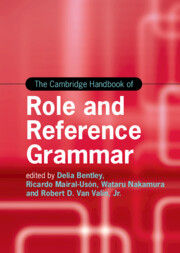Book contents
- The Cambridge Handbook of Role and Reference Grammar
- Cambridge Handbooks in Language and Linguistics
- The Cambridge Handbook of Role and Reference Grammar
- Copyright page
- Dedication
- Contents
- Figures
- Tables
- Contributors
- Pedagogical Guide to The Cambridge Handbook of Role and Reference Grammar
- Introduction
- Part One Overview
- Part Two Topics in RRG: Simple Sentences
- 2 Lexical and Grammatical Categories in RRG
- 3 A Conceptually Oriented Approach to Semantic Composition in RRG
- 4 Semantic Macroroles
- 5 Grammatical Relations
- 6 Argument Structure Alternations
- 7 Case Assignment
- 8 Morphology in RRG
- 9 Adverbs, Mimetics and Ideophones
- 10 Adposition Assignment and Adpositional Phrase Types in RRG
- 11 The RRG Approach to Information Structure
- 12 Information Structure and Argument Linking
- Part Three Topics in RRG: Complex Sentences
- Part Four Applications of RRG
- Part Five Grammatical Sketches
- Index
- References
2 - Lexical and Grammatical Categories in RRG
from Part Two - Topics in RRG: Simple Sentences
Published online by Cambridge University Press: 08 June 2023
- The Cambridge Handbook of Role and Reference Grammar
- Cambridge Handbooks in Language and Linguistics
- The Cambridge Handbook of Role and Reference Grammar
- Copyright page
- Dedication
- Contents
- Figures
- Tables
- Contributors
- Pedagogical Guide to The Cambridge Handbook of Role and Reference Grammar
- Introduction
- Part One Overview
- Part Two Topics in RRG: Simple Sentences
- 2 Lexical and Grammatical Categories in RRG
- 3 A Conceptually Oriented Approach to Semantic Composition in RRG
- 4 Semantic Macroroles
- 5 Grammatical Relations
- 6 Argument Structure Alternations
- 7 Case Assignment
- 8 Morphology in RRG
- 9 Adverbs, Mimetics and Ideophones
- 10 Adposition Assignment and Adpositional Phrase Types in RRG
- 11 The RRG Approach to Information Structure
- 12 Information Structure and Argument Linking
- Part Three Topics in RRG: Complex Sentences
- Part Four Applications of RRG
- Part Five Grammatical Sketches
- Index
- References
Summary
This chapter deals with lexical and grammatical categories in Role and Reference Grammar (RRG). First, it discusses a range of functionally motivated, non-endocentric syntactic categories, such as the nucleus (NUC), containing the predicate, referential phrases (RPs) and modifying phrases (MPs). Although these units are typically realized by verbs, nouns and adjectives/adverbs, respectively, this is not always so, and many languages allow for non-verbal predicates, non-adjectival modifying phrases, etc., while other languages show little to no evidence for categories such as noun, verb or adjective. This is captured in RRG by assuming that NUC, RP and MP are not universally linked to particular lexical categories. The chapter also discusses grammatical categories which are referred to in RRG as operators, and which ground the clause, core or nucleus (TAM markers, evidentials, etc.), as well as categories which are primarily concerned with questions of reference, such as number, definiteness, deixis, etc., which ground the RP.
- Type
- Chapter
- Information
- The Cambridge Handbook of Role and Reference Grammar , pp. 181 - 217Publisher: Cambridge University PressPrint publication year: 2023

